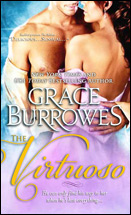 A blog commenter recently asked me what, exactly, was wrong with Lord Valentine Windham’s hand that it became so inflamed? Was his whole problem psychosomatic?
A blog commenter recently asked me what, exactly, was wrong with Lord Valentine Windham’s hand that it became so inflamed? Was his whole problem psychosomatic?
Physician David Worthington, Viscount Fairly, intimates as much, and Valentine supports that diagnosis when he notes (to himself) that the first twinge of pain came when he closed his hand around the symbolic clod of earth that began the process of burying his brother Victor.
In fact, Valentine has buried two brothers, and hasn’t really let go of the keen grief resulting from either death. He’s lost two more brothers to the inexorable grip of happy marriages, and his oldest brother, Devlin, has also removed two hundred miles north to the West Riding.
Valentine has been holding onto to a lot of bewildering losses—no wonder his hand aches.
Except… This is one of my early manuscripts, and as such, has been significantly pared down from its original first draft… pared down by, oh, say 50,000 words. That means there’s half a book I’ve written about this story that you haven’t read, and buried in that half a book is more information about Val’s ailment.
As a child, trying to keep up with his older brothers while skating, Val had a fall on an outstretched hand (FOOSH). He hid the condition from Her Grace, and by the time His Grace figured out that his baby boy was injured, the affected wrist was healing. His Grace pronounced it a bad sprain (it was a fracture), and tried to tell himself that stoicism even in a five year old is something to be proud of. (Her Grace would have known better.)
In modern medical terms a FOOSH is one condition that can create a predisposition to carpal tunnel syndrome. Val’s symptoms—worse inflammation around the thumb and index fingers than the other fingers, abatement of inflammation following rest—are consistent with a diagnosis of carpal tunnel. Repetitive stress can play a role in carpal tunnel, but so too, the literature suggests, can chronic emotional stress.
So maybe Valentine had a case of carpal tunnel that resolved with rest.
Or maybe it was a matter of him having to let go of what ailed his heart before his hand would heal. I’ve been around a lot of dedicated pianists, and as a group, I’ve noticed they tend not to suffer ailments of the hand—to the contrary, many of them ply their instruments with breathtaking skill very late in life (Eubie Blake, Marion McPartland, Arturo Rubinstein, Dave Brubeck to name a few).
To answer the question then, I know Valentine’s ailment was at least physical, but David Worthington was right too: Illness can have its origins in the emotions of the heart, and healing can originate there too.
Have you ever endured an ailment you suspected was more of the heart than the body?








